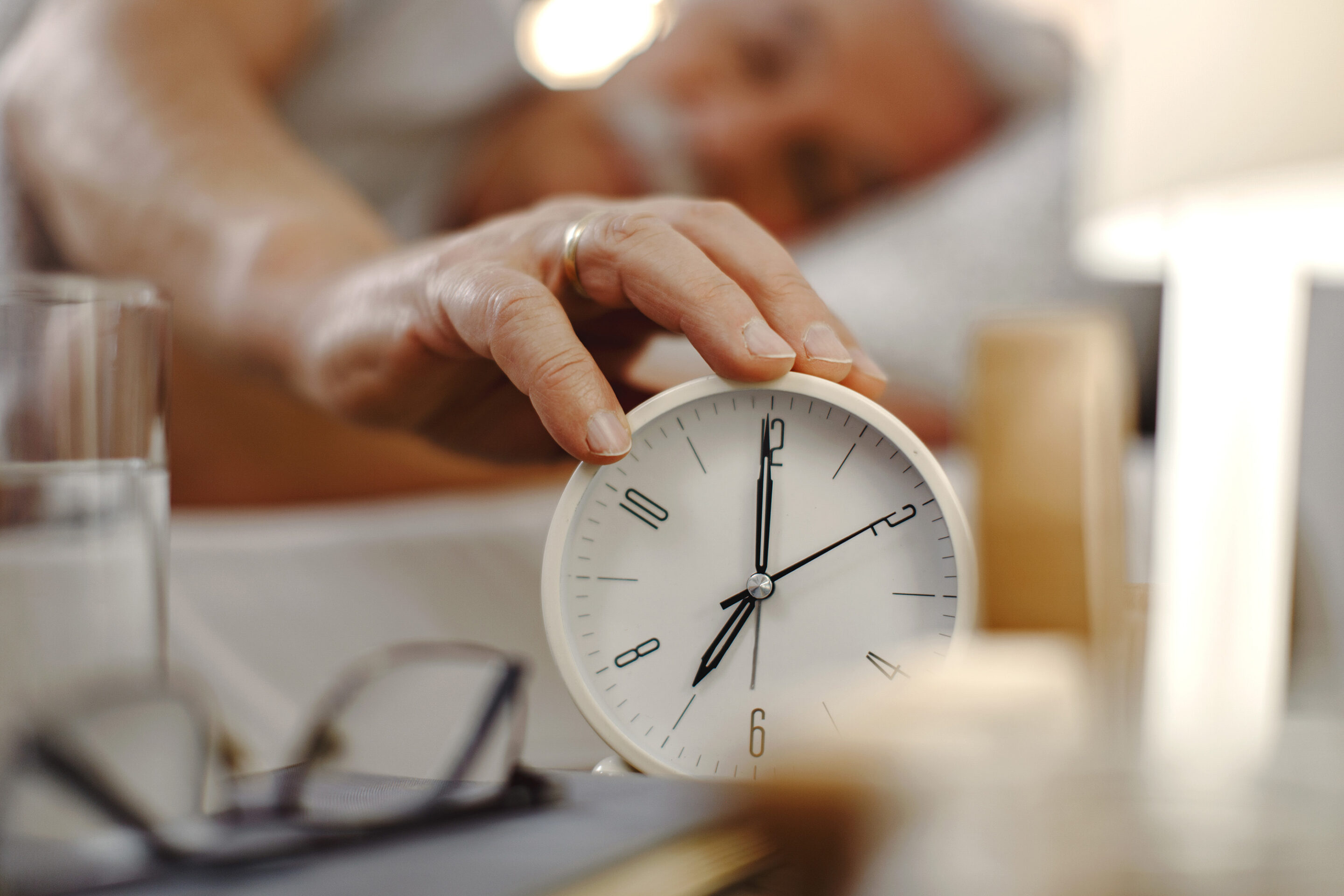This month, Ontario shifted back to Standard Time, also known as daylight savings, giving us brighter mornings but shorter days. Although many people herald “Fall Back” as the time shift allows us to enjoy one extra hour of sleep (something we’ll pay for in the spring!). This subtle disruption of our waking/sleeping routine can impact us in several ways. For example, the sudden change in daylight hours impacts daily rhythms, affecting everything from sleep quality and mood to personal safety.
For an older loved one, and even many children, this seemingly small one-hour change can be challenging to navigate.
Family caregivers can help mitigate risks and support affected loved ones by making thoughtful adjustments that make the transition easier and less impactful.
Why Daylight Saving Time Affects Seniors Differently
As we get older, our bodies rely more heavily on consistent light patterns to regulate our natural sleep and wake cycles, known as the circadian rhythm. Even a minor shift in the amount of daily sunlight can significantly affect this internal clock, translating into a range of issues for older adults, including fatigue, confusion, and increased irritability in the days or even weeks following the time change. It can also compound existing problems in older people who already experience fragmented or disrupted sleep.
This happens because the lack of consistent light exposure, particularly in the evening, can confuse the body’s natural cues for rest and alertness, putting the person at risk of many issues, including those affecting their mental health.
Mood and Mental Health: Coping with Shorter Days
Your loved one’s mental well-being is also at risk. The reduced exposure to natural sunlight can impact the production of Vitamin D and serotonin, chemicals essential for regulating mood and motivation. For some, this shift can trigger symptoms of Seasonal Affective Disorder (SAD), impacting the person’s overall engagement and motivation.
As a family caregiver, you can help reduce the risk that your loved one will develop a mood-related condition caused by less sunlight by organizing their daily routines, meals, and social activities during daylight hours. Sitting by a window during breakfast or planning an early afternoon walk has the potential to improve your older loved one’s mental health during this difficult time.
Safety Concerns After the Clocks Change
Just a few months ago, the sun was setting as late as 8:45 pm. Now, we’re starting to see encroaching darkness before 5:00 pm on some days. This reduction in natural sunlight significantly affects visibility, raising safety concerns for older adults who usually enjoy walks, prepare dinner, or typically return from appointments later in the day.
One of the most common accidents that happen to older people due to poor visibility is falling, which can result in serious injuries that can impact mobility for weeks or months and lead to social isolation. Here are some tips to help you proactively safeguard your loved one against falling and other problems that can result from low visibility:
Create a brighter home environment
Ensure that entrances, stairways, and walkways are well-lit. Consider installing motion-sensor lighting that turns on when your loved one approaches a poorly-lit area of their home. Another good idea is to install automatic nightlights in hallways, bathrooms, bedrooms, or other areas where they might need to navigate in the middle of the night. Outside the home, ensure that the path leading to the front door, including any stairs or ramps, are brightly illuminated.
Declutter the home – inside and out
Rugs that curl at the edges, electrical cords, or loose objects are far more dangerous when someone is moving in reduced light. Ensure walkways are free of anything that could cause a trip or fall. The home’s exterior should also be free of tripping hazards such as hoses, flower pots, or uneven pavement.
Limit their driving hours
If your loved one still drives, there may be safety issues if they get behind the wheel after dark. If they must venture out for groceries or to run errands in the late afternoon or evening, consider hiring a taxi, an Uber, or another ride-sharing service, or driving them yourself to help maximize road safety.
Adjusting Sleep and Daily Routines
Better sleep hygiene is a great way to help your loved one adjust to the decrease in natural sunlight. Here are some tips that should help:
- Ensure their bedroom is cool, dark, and quiet
- Use warm, dim lighting in the bedroom
- Block exposure to blue light from screens, such as televisions, tablets, and cellphones, one hour before bedtime
Furthermore, you can help your loved one adjust by making any schedule changes in small increments over a few days to minimize shock to their system. Maintaining a predictable pattern for medication times, meals, and daily activities reinforces the circadian rhythm and reduces the confusion or disorientation that the time change can induce.
When to Seek Professional Help
As a family caregiver, you will likely be the first to notice subtle changes in your older loved one’s well-being. While minor sleep and mood disruptions are common after the clocks change, your loved one should visit a health professional if the symptoms persist for longer than two weeks. Also, a doctor should be informed about any changes in appetite or if the person shows signs of severe fatigue or increased confusion.
As always, CareHop is only a phone call away when you need empathetic, consistent support from professional caregivers who will help maintain crucial routines, manage medication schedules, and offer compassionate companionship to enhance your loved one’s health and happiness, especially as the seasons change and the days grow shorter.
Quality In-Home Elder Care Services in Toronto, Etobicoke, Mississauga, and Brampton
CareHop specializes in providing safe, professional eldercare services, including on-demand Alzheimer’s disease and dementia care, personal care, and assistance with physical activities whenever you need it.
Contact us today for a free, no-obligation discussion to discover how we can help you with safe, cost-effective eldercare solutions.




